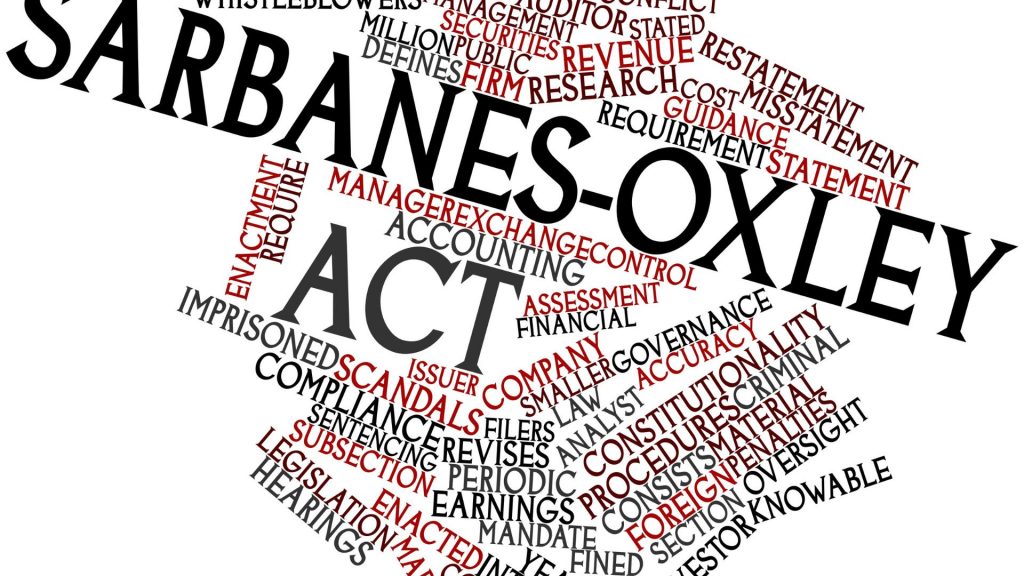The Sarbanes-Oxley Act of 2002, is a federal law that is characterized as “the most far-reaching reforms of American business practices since the time of Franklin Delano Roosevelt.” The SOX Act mandated several reforms, to enhance corporate responsibility, enhance financial disclosures, and combat corporate accounting fraud. The Act created the “Public Company Accounting Oversight Board,” also known as the PCAOB, to oversee the activities of the auditing profession.
The Sarbanes-Oxley Act Of 2002
The SOX Act of 2002 came in response to the financial scandals reported in the early 2000s involving scandals of Enron Corporation, Tyco International plc, and WorldCom. The significant frauds shook investors’ confidence and led to the demand for regulatory standards.
The Sarbanes-Oxley (SOX) Act of 2002 was enacted in response to high-profile corporate financial scandals that occurred earlier that decade. The act imposed stricter recordkeeping requirements and new rules for accountants, auditors, and corporate officers. The act also added new criminal penalties for securities law violations.
The rules and enforcement policies outlined in the Sarbanes-Oxley Act of 2002 amended or supplemented existing laws dealing with security regulation, including the Securities Exchange Act of 1934. The Sarbanes-Oxley Act of 2002 is a complex and lengthy piece of legislation. Three of its key provisions are commonly referred to by their section numbers: Section 302, Section 404, and Section 802.
Section 302, Section 404, And Section 802
Section 302 of the SOX Act mandates that senior corporate officers personally certify in writing that the financial statements “comply with SEC requirements related to disclosure, and fairly present in all material aspects the operations, and financial condition of the issuer.” Officers who sign off the financial statements of the company that they know to be inaccurate are subject to penalties.
Section 404 of the SOX Act requires that the management and auditors establish internal controls, and reporting systems to ensure the adequacy of those controls.
Section 802 of the SOX Act covers three rules that affect the recordkeeping requirements.
The first deals with the destruction, and falsification of the records. The second strictly defines the retention period for storing records. The third rule outlines the specific business records that companies need to store, which includes electronic communications.
Other than the financial side of the company, such as audits, and controls, the SOX Act outlines the requirements related to the information technology departments regarding the maintenance of electronic records. The act defines which company records need to be kept on file, and the period of maintenance of records.
Aside from the financial aspects of a business, such as audits, accuracy, and controls, the SOX Act of 2002 specifies requirements for information technology (IT) departments in terms of electronic records. The act does not prescribe a set of business practices in this regard, but rather specifies which company records must be kept and for how long. The SOX Act of 2002 does not specify how a business should store its records, only that it is the responsibility of the company’s IT department to do so.
Final Thoughts
The Sarbanes-Oxley Act of 2002 is a United States law. On July 30, 2002, Congress passed the SOX Act of 2002 to help protect investors from fraudulent financial reporting by corporations. It mandated strict reforms to existing securities regulations and imposed harsh new penalties on lawbreakers.
The Sarbanes-Oxley Act of 2002 was enacted in response to financial scandals involving publicly traded companies such as Enron Corporation, Tyco International plc, and WorldCom in the early 2000s. The high-profile frauds shook investor confidence in the reliability of corporate financial statements, prompting many to call for an overhaul of decades-old regulatory standards.





